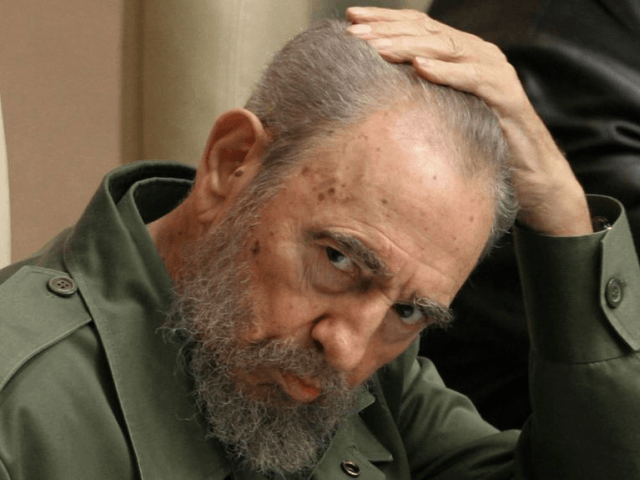The official newspaper of the Communist Party of Cuba, Granma, celebrated the opening of the regular Party Congress on Friday with an article boasting, “Fidel is more alive than ever, Raúl is still leading us.”
The Communist Party confirmed that Fidel Castro, the longtime communist dictator of the island, died in November 2016. Raúl Castro, his brother and longtime executioner, took over the country at the time. In communist regimes, the government rarely acknowledges the leaders’ deaths. North Korean founder Kim Il-sung remains the nation’s “eternal president” despite dying in 1994; Hugo Chávez has kept his title of “eternal commander” since his death in 2013.
Mainstream American media outlets spread rumors late on Thursday and into Friday that the younger Castro would step down from being the chairman of the Party at this year’s Congress, citing the fact that Raúl promised to do so in 2018. As Raúl Castro is nearly 90 years old, a formal exit from governance is likely.
Raúl opened the Party Congress on Friday.
If he resigns, Raúl leaves at least two of his children – Mariela and Alejandro – as senior Communist Party officials. A bevy of Castro children, grandchildren, in-laws, and cousins also maintain high-ranking positions in the Party. Some are not affiliated with the Party formally but benefit from it, such as Fidel Castro’s grandson Sandro, a nightclub owner and social media influencer.
The Communist Party of Cuba is the only legal political party in the country. Cuban citizens who publicly voice disagreement with any Party policies face severe legal repercussions including prosecution, public beatings, torture, and forced exile. “Disrespect” against the Party is a crime in Cuba.
“46 years from that first Congress, Fidel is more alive than ever, Raúl keeps leading us from the vanguard that is the Party, and [Cuban President Miguel] Díaz-Canel, who represents the best of all the firmness and intelligence that there is in continuity, are sufficient motives to begin this most important of celebrations,” Granma proclaimed. The propaganda newspaper celebrated that the Congress is allegedly “beleaguering those who seek to defeat this tremendous Revolution.”
The Cuban constitution passed under Fidel Castro gives the highest powers of the nation to the Party. The chairman of the Communist Party and the commander-in-chief of the armed forces, typically the same person, is the head of government. A position called “president” also exists, but is subordinate to the two previously mentioned. Díaz-Canel took the title of “president” Raúl Castro held in 2018, allowing him to travel abroad to represent the frail dictator, declaring in an acceptance speech that Raúl Castro would always “preside over all major decisions for the present and future of the nation.”
In another article detailing the topics for discussion at the Congress, Granma stated that “economic recovery” from four years of extensive human rights sanctions on the island under former President Donald Trump was at the top of the agenda. Trump restored Cuba to its place on the State Department’s state sponsors of terrorism list, banned cruises to Cuba (which profited from the use of stolen American land and violated bans on tourism there), and personally sanctioned several of the younger members of the Castro family, limiting their ability to maintain their lavish lifestyles. The newspaper also mentioned the lawmakers would discuss the country’s response to the Chinese coronavirus pandemic, which has significantly affected citizens given the poor state of the Cuban socialist healthcare system.
Like many major Communist Party events, the Cuban regime preceded Friday’s Congress with a purge. Exiting the government this week were the Minister of the Revolutionary Armed Forces Leopoldo Cintra Frías and Agriculture Minister Gustavo Rodríguez Rollero. The Cuban armed forces are at the forefront of one of Cuba’s most lucrative trades, tourism, owning and running some of the country’s most popular hotels, restaurants, and beachfronts. Cuba’s agriculture industry has suffered tremendously in the past half-decade, failing to meet basic expectations for the cultivation of key crops like wheat and sugar.
Dissident observers on the island considered the purge, particularly the removal of Cintra Frías, an attempt to ensure only Raúl Castro’s most loyal henchmen were in power if Castro were to retire. Cintras Frías is 80 years old, meaning that not removing from his post currently would likely give someone other than Raúl Castro the power to choose a handpicked successor if Castro stepped down as chairman.
“Raúl Castro is moving the figures he has to to shield in some way, or try to shield, the power that he is leaving to his son and his close people,” Antonio Rodiles, the head of the anti-communist Cuban group Estado de Sats, told Cubanet this week, noting that Castro appears to be limited to “appealing to individuals over the age of 80” to maintain the maximum amount of power possible.
“In these types of regimes, where legitimacy comes from companionship and personal closeness, I think this move is a response to that – who is closest to who, who offers a little more trust,” Manuel Cuesta Morúa, another dissident and spokesman for the group Arco Progresista, told Cubanet. “I have the impression that that is where the change is going, which they are making look like a renovation.”
Follow Frances Martel on Facebook and Twitter.

COMMENTS
Please let us know if you're having issues with commenting.